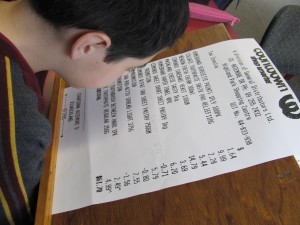David is an 11 year old who started at his local intermediate in Term 1 of 2012.
David is supported by a Resource Teacher Vision, Soong Joseph and is learning about money and budgeting.
Figure 1 shows David out shopping and using money.
Understanding money
Currently, David is working on expanding his skills in numbers relating to money.
He is developing skills in interpreting a receipt which involves learning about the content and purpose of each section of the receipt.
Prerequisite Skills
- David has some knowledge of money value in notes and coins.
- David is able to present an amount given in at least two ways; e.g. $2.50 can be presented by a $2.00 coin and a 50 cent coin or two $1.00 coins and five 10 cent coins.
- Through role play David was able to to pay for items from the ‘Play Dairy’ using play money.
Where to next for David
- Learning the concept of addition with dollars and cents.
- Learning to round amounts to the closest dollar and cent.
- Learning to make an estimate on the price of an object and making a comparison to the actual price.
- Learning how to write a shopping list and shopping to this list.
- Purchasing items by brand, cheapest price and value for money.
- Learning how to carry out a payment transaction at the checkout.
- Learning about the different ways of paying; cash, EFTPOS and credit card.
Teaching methods and strategies
- An actual receipt was enlarged to give David detailed access to the contents of the receipt.
- David was taught to use a calculator when adding prices of items on a shopping list.
- David arranged pictures of shopping items into different categories; e.g. meat, fruit and vegetables, grooming items, canned food, etc to enable him to relate to shopping and money.
- Writing up an estimate and then comparing it to the actual price, developing a sense of the value of money.
- Organising a hands-on experience involving the process of choosing a dish to prepare, looking for a recipe, making a shopping list, making an estimate of the shopping list, taking a trip to the local supermarket to purchase items, carrying out a transaction to pay for items, storing bought items accordingly and the actual food preparation.
Learning adaptations
- Work presented to David had to be enlarged to N36 to enable him to access the document, e.g. the recipe and receipt had to be enlarged. A slope board was used to give him better access and enabled David to read with good posture.
- Play money was presented on a white sheet of card, giving it good contrast. This helped David to identify the different notes and coins individually and correctly.
- The use of a calculator enabled him to get the total amount faster and the calculator was portable enough to carry when he is out shopping. Knowing the total amount also enabled him to use the correct change when paying for the shopping.
Assessment
A ‘whole child’ approach was used to assess David against the different areas covered in the Expanded Core Curriculum. It was decided that David needed to develop independent living skills as this is not one of the learning areas within the New Zealand Curriculum. Another consideration, was that developing life skills would be a meaningful and useful experience as he transitions into a young adult.
Useful Links
- State Standards and the Expanded Core Curriculum Aligned – A resource for Parents, Teachers and Administrators.
- Activities of Daily Living: Teaching Blind Children Everyday Organizational & Living Skills – WonderBaby website.
- Financial Literacy Grade 7 and 8: Making Smarter Choices – Ontario Ministry of Education.
- 2010 Guidelines for Working with Students Who are Blind or Visually Impaired in Virginia Public Schools – Virginia Department of Education.
- Academics Are Not Enough: Incorporating Life Skills in the Curriculum for Children and Youth with Visual Impairments – Council for Exceptional Children website.
- The Expanded Core Curriculum for Blind and VI Children and Youths – American Foundation of the Blind Website.
More information
Email us at BLENNZ Online for more information about this subject.
We will link you up with either the author of this post or another BLENNZ colleague with whom you can continue your conversation.



